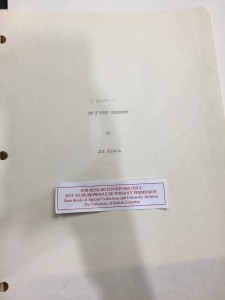Hello again!
Recently, my ASTU class had visited the UBC Archives. We learned about the uses of an archive, and were given the opportunity to browse through the Joy Kogawa fonds, a collection of documents from the author of Obasan.
It was an interesting experience. We were able to see how Kogawa’s many drafts, where there were many corrections and whole parts added or cut out, and other various documents like letters. Seeing a writer’s progress is always a rather engaging experience, as one can trace a writer’s initial piece to the final product. Seeing the difference between the two can be surreal, since readers usually only ever see the final copy that is published. You find vast differences in certain scenes you had read in published copy from the first few drafts, scenes that seem unrecognisable in the first draft warping into the iconic ones that you have read.
It is not only iconic scenes that develop from first drafts, but even titles! One of the titles Kogawa had previously used for Obasan is “If I must Remember”. I found that interesting because Obasan is a book about remembrance. The protagonist, Naomi, remembers the events of the internment of Japanese-Canadians and her own personal history. There are even technologies of memory used inside the book. Aunt Emily’s letters contain descriptions of the events and emotions during the start of Japanese Internment, and are given meaning by the individuals reading them as they interpret it and fit it into their understanding of this particular point in Canadian history (Kogawa 125-157). When thinking of Obasan as a book for remembering, the title suits it very well.
However, Kogawa had decided to strike that title, and use “Obasan” instead, which means “aunt” in Japanese. I personally do not know why she chose to use that title instead, but the single-word title does hold more of an appeal than “If I Must Remember”.
It had been speculated in class before that the reason why that title was chosen is because of the role Naomi’s aunt/obasan had in Naomi’s life. Naomi’s obasan essentially became her caretaker while her mother was trapped in Japan. She cared for Naomi and Stephen, taking responsibility for them and protecting them when she could, and keeping them together.
On the other hand, Aunt Emily had also done quite a bit for Naomi. Aunt Emily worked very hard in finding a place for them to stay, contacting people for help (Kogawa 147), and making runs to different places like the bank to get things in order for the family and their move (Kogawa 157). Aunt Emily’s documents – technologies of memory – were also used as a prompt for Naomi to remember the events of the Japanese Internment, to remember and speak about it rather than stay silent and thus allow the memories to fade.
I believe that the title “If I must Remember” would because of Aunt Emily, as she encourages Naomi to remember even when she does not wish to. Because of this, I think it could be possible that “Obasan” is also referring to Aunt Emily as well as Naomi’s obasan, because they both play large roles in Naomi’s life and the remembrance of the Japanese Internment. “Obasan”, after all, is not just used to refer to a single aunt. It is a word used for all aunts.
